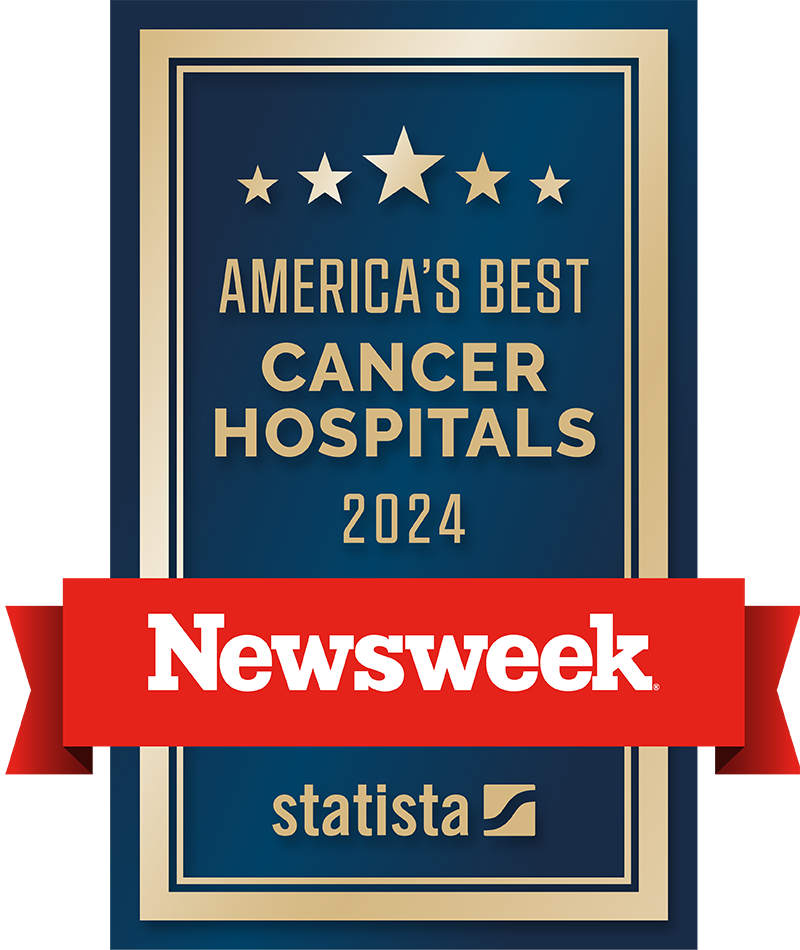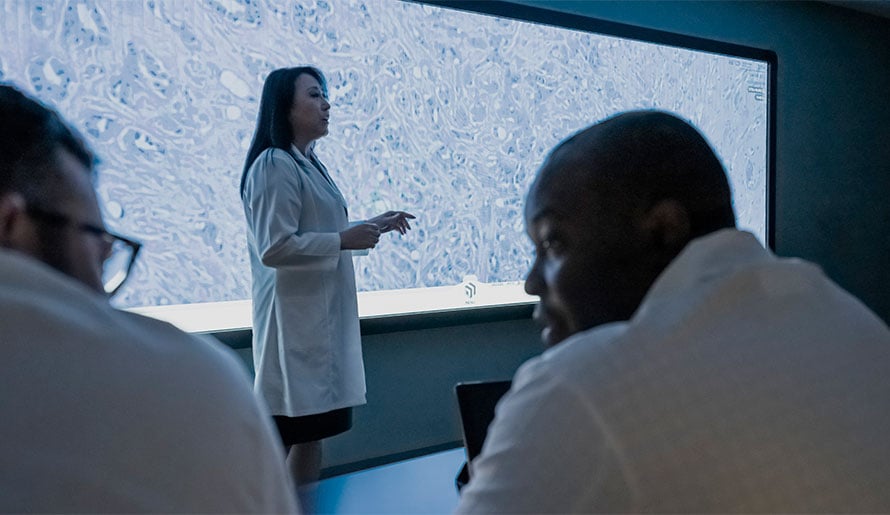Stomach Cancer Diagnosis
Stomach cancer symptoms may be unrecognizable in the cancer’s early stages because the symptoms may not appear initially, or, if they do, they may seem unrelated to cancer. In fact, some symptoms may be caused by another ailment altogether, such as an ulcer, stomach virus or even another type of cancer. For this reason, it’s important for a patient to seek a professional diagnosis to determine whether or not the symptoms they’re experiencing are being caused by stomach cancer.
Table of Contents
Causes and Risk Factors | Screening | Types | Stages
Stomach Cancer Causes and Risk Factors
While the exact causes of stomach cancer are not fully understood, several factors have been identified as increasing the risk of developing this disease. These risk factors can include lifestyle choices, genetic predisposition, and certain health conditions. Understanding these factors can help individuals take steps to reduce their risk and potentially detect stomach cancer at an earlier, more treatable stage.
-
26,400
new stomach cancer diagnoses in the U.S. per year
-
11,000
deaths attributed to stomach cancer in the U.S. per year
What causes stomach cancer?
Scientists believe stomach cancer may develop when cancer-causing substances in consumed food come in contact with the mucosa. Another possible cause is chronic inflammation of the mucosa, which may result from an abnormally sustained immune system response. Both can trigger harmful DNA changes in the mucosal cells that promote uncontrolled cell growth, leading to the formation of a tumor.
What are the risk factors for stomach cancer?
Risk factors characteristics, behaviors and exposures that can increase the risk of—but do not directly cause—gastric cancer. Some risk factors can be controlled, but others cannot.
Stomach cancer risk factors that can be controlled
By making healthy lifestyle changes, it may be possible to control certain stomach cancer risk factors, such as:
- Poor nutrition – A diet high in smoked, pickled, fermented, salted or preserved foods is a major risk factor for stomach cancer.
- Helicobacter pylori (H. pylori) infection – A bacterium that causes stomach inflammation and ulcers, H. pylori can be effectively treated with antibiotics.
- Obesity – Carrying excess body fat increases the likelihood of stomach inflammation and cancer.
- Tobacco and alcohol use – Smoking and excessive consumption of alcoholic beverages are well-established risk factors for many types of cancer, including gastric cancer.
- Occupational exposures – Individuals who work in dusty or high-temperature processing environments and those who are exposed to certain industrial chemicals, such as chromium, are at heightened risk for developing stomach cancer.
Stomach cancer risk factors that cannot be controlled
Certain stomach cancer risk factors cannot be controlled, such as:
- Advanced age – Most cases are diagnosed after age 55.
- Family history – Individuals with a close relative who was diagnosed with gastric cancer are at increased risk.
- Inherited cancer predisposition syndromes – Hereditary diffuse gastric cancer (caused by CDH1 gene mutation), familial adenomatous polyposis (FAP), Li-Fraumeni syndrome, Lynch syndrome, juvenile-polyposis syndrome, Peutz-Jeghers syndrome and hereditary breast and ovarian cancer syndrome have been conclusively linked to stomach cancer.
- Certain medical conditions – Atrophic gastritis and intestinal metaplasia, which caused cells in the lining of the upper GI tract to mimic intestinal cells, and pernicious anemia, stomach polyps and achlorhydria are strongly associated with chronic stomach inflammation and thinning of the mucosa.
- Prior stomach surgery – If a portion of the stomach is surgically removed, the risk of gastric cancer increases.

Ranked a Top Cancer Hospital in Nation
Moffitt is ranked 15th in the nation and is the top-ranked cancer hospital in Florida and the Southeast in Newsweek’s “America’s Best Cancer Hospitals."
Stomach Cancer Screening
Stomach cancer screening can be performed using several different tests. However, none of the current screening methods are widely recommended for people who do not have symptoms or have not been identified as having a heightened risk of developing the condition. It’s important to note that even if a patient has one or more risk factors for developing stomach cancer, not all of the below stomach cancer screening tests are necessarily appropriate.
While there is no standard stomach cancer screening test, several approaches are being evaluated for routine use. Some of those approaches include tests that are often recommended for individuals who have undergone a partial gastrectomy or have chronic gastric atrophy, pernicious anemia, stomach polyps, familial adenomatous polyposis or hereditary nonpolyposis colon cancer, all of which are believed to increase the risk of developing stomach cancer.
Barium-meal gastric photofluorography
A patient drinks a liquid that contains barium (a silver-white metallic compound), which coats the esophagus and stomach after being swallowed. A series of X-rays is then taken of the esophagus and stomach. The barium provides additional clarity and makes it possible for a physician to observe the motion of the organs.
Upper endoscopy
An endoscope (a thin, tube-like instrument that has a light and a lens for viewing) is passed through a patient’s mouth, down the throat and into the esophagus. A physician is then able to view the inside of the esophagus, stomach and duodenum to check for abnormalities. If necessary, a physician can also obtain a small tissue sample to be later evaluated under a microscope for cancer cells.
Serum pepsinogen measurements
These blood tests measure the level of pepsinogen in a patient’s blood. A low level of pepsinogen can sometimes be a sign of chronic gastric atrophy, which can lead to stomach cancer.

Stomach Cancer Outcomes
The primary aim of cancer treatment is to attain the best possible outcome with minimal side effects, ensuring the highest quality of life for the patient. On average, Moffitt's stomach cancer treatment survival rates exceed 1.5 times the national average.
Can stomach cancer be prevented?
By addressing known risk factors that are controllable, such as consuming a healthy diet, avoiding tobacco use and managing an H. pylori infection, it may be possible to reduce the risk of developing stomach cancer. Additionally, uncontrollable risk factors, such as advanced age and genetics, can inform more vigilant monitoring and early detection strategies.
What are the different types of stomach cancer?
There are several types of stomach cancer, which are primarily determined based on where the tumor originates. The stomach is made up of five different layers – the mucosa, submucosa, muscularis propria, subserosa and serosa – and each layer has a specific function in the stomach’s ability to digest food. For example, the mucosa is the innermost layer of the stomach where acid and digestive enzymes are made, the muscularis propria is made of muscles that contract to help the stomach mash up food and the serosa is the outermost layer that helps hold the organ together.
Stomach cancer that develops in the mucosa is called adenocarcinoma and is the most common type, accounting for 90 to 95 percent of all stomach cancer. Several other types make up the remaining 5 to 10% of stomach cancers.
- Adenocarcinoma – begins in the mucosa and then spreads outwards into the other four layers
- Lymphoma – originates in the immune system tissues located in the wall of the stomach
- Carcinoid tumors – develop in the hormone-creating cells of the stomach and typically do not spread
- Squamous cell carcinoma – occurs in the skin-like cells that make up the stomach lining
- Small cell carcinoma – a type of neuroendocrine tumor that often develops in conjunction with other tumor types, and is extremely rare
- Leiomyosarcoma – starts in the smooth muscle cells of the stomach
- Gastrointestinal stromal tumors (GIST) – begins in interstitial cells of Cajal, which are cells in the wall of the stomach
- Hereditary diffuse gastric cancer (HDGC) - a type of rare cancer, caused by a genetic condition, that grows in the stomach. Having HDGC increases the risk of getting other types of cancer, such as breast cancer. Moffitt's CDH1 Clinic coordinates multidisciplinary care between Genetics, Gastroenterology (both endoscopy and surgery) and the Breast department to provide surveillance and treatment in HDGC patients.


Rated High Performing in Gastrointestinal Cancer Surgery
Schedule an AppointmentStomach Cancer Stages
Stomach cancer stages are measurements that physicians often use to describe the extent to which a patient’s cancer has grown and spread to other tissues or organs. Staging provides consistent terminology that can be useful to an entire team of medical professionals.
To assign an appropriate stage to your cancer, a physician will typically order a series of diagnostic tests, such as physical examinations, imaging scans, blood analyses and biopsies, and then thoroughly analyze the results. When assessing a cancer, one of the following stomach cancer stages will generally be assigned:
What is stage 0 stomach cancer?
Abnormal cells have been identified in the inner layer of the stomach, but nowhere else.
What is stage 1 stomach cancer?
A tumor has spread into the second layer of the stomach (submucosa), and malignant cells have been found in up to six lymph nodes. This stage may also be assigned if a cancer has spread to the muscular layer of the stomach (subserosa), but has not spread to any lymph nodes or nearby organs.
What is stage 2 stomach cancer?
Malignant cells have spread only to the submucosa and can be found in seven to 15 lymph nodes, a tumor has invaded the subserosa and spread to up to six lymph nodes, or a tumor has affected the outer layer of the stomach (serosa), but has not spread to lymph nodes or nearby organs.
What is stage 3 stomach cancer?
Cancer has spread to the subserosa and invaded up to 15 lymph nodes, or malignant cells have spread to other nearby organs, but not area lymph nodes or organs that are further away from the stomach.
What is stage 4 stomach cancer?
A tumor has spread to more than 15 lymph nodes, malignant cells have spread to nearby organs and at least one lymph node, or the cancer has metastasized to distant organs.
Frequently Asked Questions (FAQs) About Stomach Cancer Diagnosis
The following FAQ articles provide additional information about stomach cancer diagnosis:
- What is the No. 1 Risk Factor for Stomach Cancer?
- Can Stomach Cancer Go Undetected?
- How Long Can Stomach Cancer Go Undetected?
- What to Do If You Are Diagnosed With Stomach Cancer
Check out more of our stomach cancer FAQs to find some quick answers to common stomach cancer questions.
The Moffitt Cancer Center Difference for Stomach Cancer Diagnosis
It’s important for patients who are experiencing any possible stomach cancer symptoms to seek medical attention, especially if these symptoms persist for an extended period of time or get worse. As a part of Moffitt Cancer Center’s Gastrointestinal Oncology Program, patients are assigned a multispecialty team of experts who specialize in all aspects of stomach cancer care, including diagnosis, treatment and support. If stomach cancer is diagnosed, our multispecialty team will come together in a tumor board to discuss and develop an individualized treatment plan. Designated as a Comprehensive Cancer Center by the National Cancer Institute, Moffitt offers the most advanced cancer treatment options, including some of the most effective chemotherapy and radiation treatments available, as well as innovative therapies in clinical trials that aren’t yet available at other facilities.
Contact Moffitt Cancer Center at 1-888-663-3488, or complete our new patient registration form to learn more about stomach cancer symptoms as well as our various diagnostic techniques and treatment options. No referral is needed to meet with our multispecialty team.
